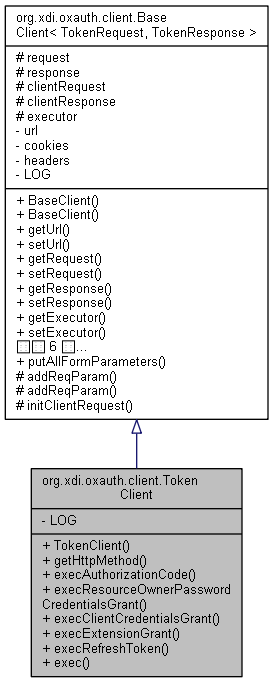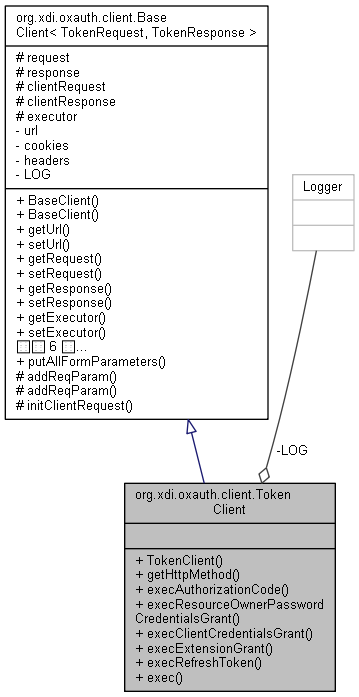

公開メンバ関数 | |
| TokenClient (String url) | |
| String | getHttpMethod () |
| TokenResponse | execAuthorizationCode (String code, String redirectUri, String clientId, String clientSecret) |
| TokenResponse | execResourceOwnerPasswordCredentialsGrant (String username, String password, String scope, String clientId, String clientSecret) |
| TokenResponse | execClientCredentialsGrant (String scope, String clientId, String clientSecret) |
| TokenResponse | execExtensionGrant (String grantTypeUri, String assertion, String clientId, String clientSecret) |
| TokenResponse | execRefreshToken (String scope, String refreshToken, String clientId, String clientSecret) |
| TokenResponse | exec () |
| String | getUrl () |
| void | setUrl (String url) |
| T | getRequest () |
| void | setRequest (T request) |
| V | getResponse () |
| void | setResponse (V response) |
| ClientExecutor | getExecutor () |
| void | setExecutor (ClientExecutor executor) |
| String | getRequestAsString () |
| String | getResponseAsString () |
| void | closeConnection () |
| List< Cookie > | getCookies () |
| Map< String, String > | getHeaders () |
静的公開メンバ関数 | |
| static void | putAllFormParameters (ClientRequest p_clientRequest, BaseRequest p_request) |
限定公開メンバ関数 | |
| void | addReqParam (String p_key, HasParamName p_value) |
| void | addReqParam (String p_key, String p_value) |
| void | initClientRequest () |
限定公開変数類 | |
| T | request |
| V | response |
| ClientRequest | clientRequest |
| ClientResponse< String > | clientResponse |
| ClientExecutor | executor |
静的非公開変数類 | |
| static final Logger | LOG = Logger.getLogger(TokenClient.class) |
詳解
Encapsulates functionality to make token request calls to an authorization server via REST Services.
- バージョン
- June 28, 2017
構築子と解体子
◆ TokenClient()
|
inline |
Constructs a token client by providing a REST url where the token service is located.
- 引数
-
url The REST Service location.
関数詳解
◆ addReqParam() [1/2]
|
inlineprotectedinherited |
◆ addReqParam() [2/2]
|
inlineprotectedinherited |
◆ closeConnection()
|
inlineinherited |
◆ exec()
|
inline |
Executes the call to the REST Service and processes the response.
- 戻り値
- The token response.
◆ execAuthorizationCode()
|
inline |
Executes the call to the REST Service requesting the authorization and processes the response.
The authorization code is obtained by using an authorization server as an intermediary between the client and resource owner. Instead of requesting authorization directly from the resource owner, the client directs the resource owner to an authorization server (via its user- agent as defined in [RFC2616]), which in turn directs the resource owner back to the client with the authorization code.
Before directing the resource owner back to the client with the authorization code, the authorization server authenticates the resource owner and obtains authorization. Because the resource owner only authenticates with the authorization server, the resource owner's credentials are never shared with the client.
The authorization code provides a few important security benefits such as the ability to authenticate the client, and the transmission of the access token directly to the client without passing it through the resource owner's user-agent, potentially exposing it to others, including the resource owner.
- 引数
-
code he authorization code received from the authorization server. This parameter is required. redirectUri The redirection URI. This parameter is required. clientId The client identifier. clientSecret The client secret.
- 戻り値
- The token response.
◆ execClientCredentialsGrant()
|
inline |
Executes the call to the REST Service requesting the authorization and processes the response.
The client can request an access token using only its client credentials when the client is requesting access to the protected resources under its control, or those of another resource owner which has been previously arranged with the authorization server. The client credentials grant type must only be used by confidential clients.
- 引数
-
scope The scope of the access request. This parameter is optional. clientId The client identifier. clientSecret The client secret.
- 戻り値
- The token response.
◆ execExtensionGrant()
|
inline |
Executes the call to the REST Service requesting the authorization and processes the response.
The client uses an extension grant type by specifying the grant type using an absolute URI (defined by the authorization server) as the value of the grant_type parameter of the token endpoint, and by adding any additional parameters necessary.
- 引数
-
grantTypeUri Absolute URI. assertion Assertion grant type. clientId The client identifier. clientSecret The client secret.
- 戻り値
- The token response.
◆ execRefreshToken()
|
inline |
Executes the call to the REST Service requesting the authorization and processes the response.
If the authorization server issued a refresh token to the client, the client can make a request to the token endpoint for a new access token.
- 引数
-
scope The scope of the access request. This value is optional. refreshToken The refresh token issued to the client. This value is required. clientId The client identifier. clientSecret The client secret.
- 戻り値
- The token response.
◆ execResourceOwnerPasswordCredentialsGrant()
|
inline |
Executes the call to the REST Service requesting the authorization and processes the response.
The resource owner password credentials grant type is suitable in cases where the resource owner has a trust relationship with the client, such as its device operating system or a highly privileged application. The authorization server should take special care when enabling this grant type, and only allow it when other flows are not viable.
The grant type is suitable for clients capable of obtaining the resource owner's credentials (username and password, typically using an interactive form). It is also used to migrate existing clients using direct authentication schemes such as HTTP Basic or Digest authentication to OAuth by converting the stored credentials to an access token.
- 引数
-
username The resource owner username. This parameter is required. password The resource owner password. This parameter is required. scope The scope of the access request. This parameter is optional. clientId The client identifier. clientSecret The client secret.
- 戻り値
- The token response.
◆ getCookies()
|
inlineinherited |
◆ getExecutor()
|
inlineinherited |
◆ getHeaders()
|
inlineinherited |
◆ getHttpMethod()
|
inline |
◆ getRequest()
|
inlineinherited |
◆ getRequestAsString()
|
inlineinherited |
◆ getResponse()
|
inlineinherited |
◆ getResponseAsString()
|
inlineinherited |
◆ getUrl()
|
inlineinherited |
◆ initClientRequest()
|
inlineprotectedinherited |
◆ putAllFormParameters()
|
inlinestaticinherited |
◆ setExecutor()
|
inlineinherited |
◆ setRequest()
|
inlineinherited |
◆ setResponse()
|
inlineinherited |
◆ setUrl()
|
inlineinherited |
メンバ詳解
◆ clientRequest
|
protectedinherited |
◆ clientResponse
|
protectedinherited |
◆ executor
|
protectedinherited |
◆ LOG
|
staticprivate |
◆ request
|
protectedinherited |
◆ response
|
protectedinherited |
このクラス詳解は次のファイルから抽出されました:
- D:/AppData/OpenId/gluu/src/oxAuth/Client/src/main/java/org/xdi/oxauth/client/TokenClient.java
 1.8.13
1.8.13